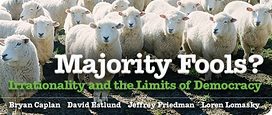In his most recent post, “The Bossy Majority,” Caplan rightly says that when a majority rules, it bosses people around every bit as much as a panel of economic experts with the power of review would be bossing people around. (Well, let’s just say in both cases they boss people. “Bossing around” connotes something extra, a kind of limitless power to boss arbitrarily. I don’t mean the majority or the panel would be doing that.) He seems to suggest that there might be some tension in my view then, since I don’t want the people bossed around by experts. In reply, I should be clear that I don’t for a moment think that there can’t ever be legitimate bosses. “What makes you boss?” is not meant to be rhetorical. I think in some cases there can be a satisfactory answer. My argument was that “because I know best” isn’t a satisfactory answer. It wouldn’t justify the rule of economists or college graduates, any more than it would justify the rule of the Pope or my mother, even if they do know best.
A tiny thing: Caplan calls my concern about the majority being illegitimately bossed around “quasi-libertarian.” I just don’t want terminology to confuse us. If he means that this is close to, or a version of, or a concession to political libertarianism, I think that’s not right. (And he must have meant that. If he just meant “having something to do with liberty,” then there would have been no point in saying “quasi.”) Every modern political philosophy is centrally concerned with locating the proper limits of state authority. There’s nothing libertarian about it. It would be a little like saying that when Caplan grants that state authority can be appropriately used to regulate markets in some cases where things are going badly wrong, he is being quasi-socialist. But as I say, this is not about the main point Caplan was making, which I address in the paragraph just above.

